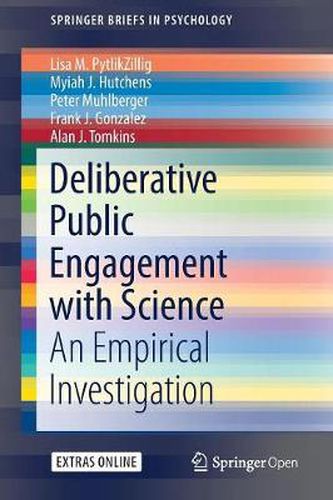Readings Newsletter
Become a Readings Member to make your shopping experience even easier.
Sign in or sign up for free!
You’re not far away from qualifying for FREE standard shipping within Australia
You’ve qualified for FREE standard shipping within Australia
The cart is loading…






This title is printed to order. This book may have been self-published. If so, we cannot guarantee the quality of the content. In the main most books will have gone through the editing process however some may not. We therefore suggest that you be aware of this before ordering this book. If in doubt check either the author or publisher’s details as we are unable to accept any returns unless they are faulty. Please contact us if you have any questions.
This compact open access reference delves beyond popular concepts of educated consumers and an informed public by examining the science behind deliberative engagement. Using data from four longitudinal studies, the authors assess public engagement methods in deliberative discussions of ethical, legal, and social issues concerning innovations in nanotechnology. Coverage includes the theoretical origins of the studies, forms of engagement and variations used, and in-depth details on cognitive, affective, and social components that go into the critical thinking process and forming of opinions. Not only are the findings intriguing in and of themselves, but researchers from varied fields will also find them useful in pursuing their own projects.
Featured in the coverage:
Experimental methods and measures used in relation to specific outcomes.
Forms of deliberative engagement affecting objective and subjective knowledge.
Effects of engagement variables on attitude formation, change, and polarization.
Tracing the processes leading to policy acceptance and support.
Study conclusions and evaluation.
Plus supplemental materials giving readers access to full study data.
Since public engagement methods are widely regarded as valuable for policy input, planning purposes, and understanding societal processes, Deliberative Engagement with Science stands to have a wide audience among psychologists, researchers, academics, and policymakers, as well as professionals in the corporate sphere and the tech industries.
$9.00 standard shipping within Australia
FREE standard shipping within Australia for orders over $100.00
Express & International shipping calculated at checkout
This title is printed to order. This book may have been self-published. If so, we cannot guarantee the quality of the content. In the main most books will have gone through the editing process however some may not. We therefore suggest that you be aware of this before ordering this book. If in doubt check either the author or publisher’s details as we are unable to accept any returns unless they are faulty. Please contact us if you have any questions.
This compact open access reference delves beyond popular concepts of educated consumers and an informed public by examining the science behind deliberative engagement. Using data from four longitudinal studies, the authors assess public engagement methods in deliberative discussions of ethical, legal, and social issues concerning innovations in nanotechnology. Coverage includes the theoretical origins of the studies, forms of engagement and variations used, and in-depth details on cognitive, affective, and social components that go into the critical thinking process and forming of opinions. Not only are the findings intriguing in and of themselves, but researchers from varied fields will also find them useful in pursuing their own projects.
Featured in the coverage:
Experimental methods and measures used in relation to specific outcomes.
Forms of deliberative engagement affecting objective and subjective knowledge.
Effects of engagement variables on attitude formation, change, and polarization.
Tracing the processes leading to policy acceptance and support.
Study conclusions and evaluation.
Plus supplemental materials giving readers access to full study data.
Since public engagement methods are widely regarded as valuable for policy input, planning purposes, and understanding societal processes, Deliberative Engagement with Science stands to have a wide audience among psychologists, researchers, academics, and policymakers, as well as professionals in the corporate sphere and the tech industries.